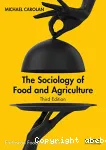| Titre : |
The sociology of food and agriculture |
| Type de document : |
texte imprimé |
| Auteurs : |
Michael S. Carolan, Auteur |
| Mention d'édition : |
Third edition |
| Editeur : |
New York (N.Y.) : Routledge |
| Année de publication : |
2022 |
| Collection : |
Earthscan food and agriculture |
| Importance : |
1 vol. (X-263 p.) |
| Présentation : |
ill. |
| Format : |
25 cm |
| ISBN/ISSN/EAN : |
978-0-367-68002-2 |
| Note générale : |
Includes bibliographical references and index |
| Langues : |
Anglais (eng) |
| Catégories : |
Agriculture
Agriculture durable
Alimentation humaine
Sociologie
|
| Mots-clés : |
Alimentation Aspect social Agriculture |
| Index. décimale : |
307.72 Sociologie rurale |
| Résumé : |
"Thoroughly revised and updated, the third edition of The Sociology of Food and Agriculture provides a cutting-edge, comprehensive introduction to the study of food and society. The book begins by examining the food economy, with chapters focussing on foodscapes, the financialization of food and a new chapter dedicated to food and nutrition (in)security. In Part 2, the book addresses community and culture. While some books only look at the interrelationships between food and culture, this section problematises the food system from the standpoint of marginalised bodies. It contains chapters focussing on agricultural and food labor and the peasantries, topics which are often overlooked, and gender, ethnicity and poverty. Part 3 examines food and the environment, with chapters addressing important topics such as agro-ecosystems, food justice, sustainable food and agriculture and food sovereignty. The final part focuses on food futures and includes a brand-new chapter on sustainable diets and ethical consumption. The book concludes by showcasing how we can rethink food production and consumption in a way that can help heal social, political and cultural divisions. All chapters draw on international case studies and include learning objectives, suggested discussion questions, and recommendations for further reading to aid student learning. The Sociology of Food and Agriculture is perfect for students of food studies, including food justice, food and nutrition security, sustainable diets and food sovereignty, environmental sociology, agriculture and cultural studies" |
| Note de contenu : |
1 Introduction to a complex and ever-changing field
PART I The multi-scalar food economy
2 Understanding foodscapes: past, present, and future
3 Food and nutrition (in)security
4 Financialization of food
PART II Community, culture, and knowledge
5 Community, labor, and peasantries
6 Food and culture
7 Gender, ethnicity, and poverty
PART III Food justice and the environment
8 Agro-ecosystems and the nature of “natures”
9 Food, agriculture, and the environment
10 Food sovereignty – beyond food security
PART IV Agrifood futures: solutions, trade-offs, and opportunities
11 Sustainable diets and ethical consumption
12 The “traps” in agrifood studies ... and beyond
13 Reimagining healthy eating |
The sociology of food and agriculture [texte imprimé] / Michael S. Carolan, Auteur . - Third edition . - New York (N.Y.) : Routledge, 2022 . - 1 vol. (X-263 p.) : ill. ; 25 cm. - ( Earthscan food and agriculture) . ISBN : 978-0-367-68002-2 Includes bibliographical references and index Langues : Anglais ( eng)
| Catégories : |
Agriculture
Agriculture durable
Alimentation humaine
Sociologie
|
| Mots-clés : |
Alimentation Aspect social Agriculture |
| Index. décimale : |
307.72 Sociologie rurale |
| Résumé : |
"Thoroughly revised and updated, the third edition of The Sociology of Food and Agriculture provides a cutting-edge, comprehensive introduction to the study of food and society. The book begins by examining the food economy, with chapters focussing on foodscapes, the financialization of food and a new chapter dedicated to food and nutrition (in)security. In Part 2, the book addresses community and culture. While some books only look at the interrelationships between food and culture, this section problematises the food system from the standpoint of marginalised bodies. It contains chapters focussing on agricultural and food labor and the peasantries, topics which are often overlooked, and gender, ethnicity and poverty. Part 3 examines food and the environment, with chapters addressing important topics such as agro-ecosystems, food justice, sustainable food and agriculture and food sovereignty. The final part focuses on food futures and includes a brand-new chapter on sustainable diets and ethical consumption. The book concludes by showcasing how we can rethink food production and consumption in a way that can help heal social, political and cultural divisions. All chapters draw on international case studies and include learning objectives, suggested discussion questions, and recommendations for further reading to aid student learning. The Sociology of Food and Agriculture is perfect for students of food studies, including food justice, food and nutrition security, sustainable diets and food sovereignty, environmental sociology, agriculture and cultural studies" |
| Note de contenu : |
1 Introduction to a complex and ever-changing field
PART I The multi-scalar food economy
2 Understanding foodscapes: past, present, and future
3 Food and nutrition (in)security
4 Financialization of food
PART II Community, culture, and knowledge
5 Community, labor, and peasantries
6 Food and culture
7 Gender, ethnicity, and poverty
PART III Food justice and the environment
8 Agro-ecosystems and the nature of “natures”
9 Food, agriculture, and the environment
10 Food sovereignty – beyond food security
PART IV Agrifood futures: solutions, trade-offs, and opportunities
11 Sustainable diets and ethical consumption
12 The “traps” in agrifood studies ... and beyond
13 Reimagining healthy eating |
|  |


